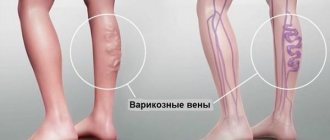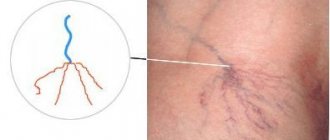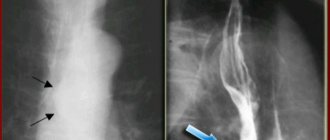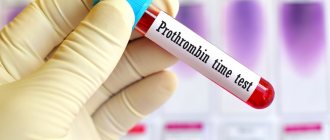Varicose veins of the penis are most often associated with a hereditary predisposition. This disease involves an enlargement of the veins on the penis by more than 6 mm. The disease is very unpleasant and can result in impotence, therefore, if you notice signs of varicose veins, you need to urgently make an appointment with a urologist.
What is varicose veins of the penis
Varicose veins of the penis are a serious pathology, accompanied by stretching of the walls of blood vessels located on the penis. This is fraught with serious consequences, including infertility.
The disease most often affects men of reproductive age. Varicose veins on the penis rarely appear on their own. It is usually preceded by dilatation of the veins of the upper extremities, located in the femoral area, or varicocele.
Why is it dangerous?
As a rule, one-time mild hemorrhages do not pose a serious threat and go away on their own. But it is better to avoid such manifestations as there may be negative effects. The most likely undesirable consequence is tissue scarring during healing.
The presence of even minor scars at the site of a burst vessel can reduce the strength of an erection due to blocking the natural blood circulation during sexual arousal. As a result, the cavernous bodies of the penis fill with blood more slowly or are not filled completely. This effect can even lead to psychological disorders due to weak erection, which will only increase its weakening.
If the scars are large, priapism or Peyronie's disease may develop. Therefore, if burst blood vessels appear on the penis, this is a sure sign that your sexuality is hyperactive and is more gentle with your manhood.
Peyronie's disease
Symptoms of varicose veins of the penis
The main complaints of men with varicose veins on the penis are aesthetic defects and problems with erection. The pathology is accompanied by the formation of nodules and impaired circulation of the organ. The following symptoms may also be present:
- pain, discomfort in the penis area;
- swelling of the organ;
- formation of bruises in the penis area;
- bluish discoloration of the veins, change in the color of the skin of the penis;
- strong bulging of veins above the surface of the skin of the penis in a non-erect state;
- tingling, burning during erection.
Complications
Any hematoma can fester and transform into an abscess. If it spreads to the corpora cavernosa, a scar will form after healing. Subsequently, it can transform into a fibrous plaque, which can lead to deterioration or absence of erection, curvature of the penis, Peyronie's disease, narrowing of the urethra and difficulty urinating.
Case from the site https://03uro.ru/consultations/question/307413 – a dangerous painful hematoma in the photo, in which it is necessary to consult a doctor.
Doctor's comment
Reasons for the development of pathology
There are several main causes of varicose veins of the penis:
- traumatic organ damage;
- varicocele, prostate tumors and other pathological conditions accompanied by impaired blood supply to the genital organs;
- chronic urinary retention, which provokes compression of the vessels that nourish the tissues of the penis;
- genetic predisposition;
- previous operations on the scrotum, penis;
- sexually transmitted diseases;
- weakness of the septa of the veins of the penis;
- passive lifestyle;
- inflammatory processes in the pelvic organs;
- the use of anesthetics during sexual intercourse, which delays the process for 30 minutes or more, causing stagnation of blood in the penis;
- frequent interruption of sexual intercourse;
- abuse of drugs to stimulate erection.
How does the disease progress?
Many men ignore the symptoms of the disease until the last minute, postponing going to the doctor. This is fraught with the development of serious complications. If you do not contact a specialist in a timely manner, the pathology can only be cured through surgery.
Swollen veins on the penis are not normal. Their permissible diameter is no more than 2-4mm. Varicose veins of the penis develop in stages:
- initial stage - the veins cannot be palpated during palpation, dilation can be detected only by instrumental methods;
- first stage - dilated veins can be felt by palpation in a standing position;
- second stage - swollen veins are felt upon palpation in a standing and lying position;
- third stage - dilated veins are visible to the naked eye, without special tools, in any position.
At the initial stages, the pathology may not make itself felt. In the second stage of the pathology, pain and discomfort occur during erection and sexual intercourse. The third stage is advanced - there are problems with erection, pain even at rest. The penis may become covered with small trophic ulcers.
If the veins on the penis are swollen, there is no need to hesitate. It is necessary to visit a doctor who will prescribe comprehensive treatment taking into account the diagnosis.
Prevention of genital diseases, including varicose veins
- Scheduled examination by a urologist
. Starting from adolescence, a man should be examined by a male doctor once a year. Having reached 45 years of age, visit a urologist every six months: at this age dangerous diseases appear - prostatitis, adenoma and prostate cancer. - Unscheduled consultation
. Make an appointment with your doctor if you notice any discharge from the genitals, rashes, itching, pain when urinating, increased frequency of urination, or changes in urine volume. These signs can indicate serious illnesses, many of which are quite easy to treat at the very beginning. - Diagnostics
. If you are sexually active, get tested regularly for sexually transmitted infections. You also need to take tests every six months if you have chronic diseases of the reproductive system, tumors, condylomas, or pathologies of the male organs. - Treatment
. Follow all doctor's recommendations. If the doctor recommends removal of the tumor or another radical treatment method, carry it out without delay! - Prevention
. When planning to conceive a child, contact a urologist and undergo all the necessary examinations. Remember that all sexually transmitted infections are a path to infertility or the birth of a sick baby. Do not forget that you need to treat STDs at the same time as your spouse.
Attention! At the first signs of decreased libido, impotence, or accelerated ejaculation, make an appointment and undergo examination and treatment by a urologist - this will save you from problems in your personal life.
Diagnosis of the disease
There is a clear algorithm for diagnosing varicose veins of the penis. First of all, the doctor conducts a visual examination and listens to the patient’s complaints. It is also necessary to undergo the following examinations:
- Ultrasound of the penis with Doppler to assess the blood supply to the organ and analyze the condition of the vessels;
- Phlebography – is prescribed if there is a suspicion that varicose veins have affected the deep veins.
The patient must undergo general urine and blood tests, and a spermogram. This will help eliminate the infectious nature of the lesion.
Examination for penile bloating
If symptoms of penile swelling appear, the patient should consult a urologist.
Depending on the accompanying symptoms and after a visual examination, the doctor will refer you for tests or to another specialist.
The basis of diagnosis is examination, collection of anamnestic data, the appointment of ultrasound with Doppler and phlebography with contrast.
Ultrasound determines the extent of blood flow disturbances present and the stage of pathological processes.
Phlebography visualizes the plexus of blood vessels.
Additionally, a laboratory test of blood and urine, a biochemical blood test, and a bacteriological culture of a smear from the urethra are performed.
Treatment of varicose veins of the penis
Treatment tactics are selected exclusively by the doctor after a comprehensive diagnosis and determination of the stage of the disease. Each case is individual. The selection of therapy is also influenced by the presence of concomitant pathologies and the general health of the patient.
Drug therapy
Involves taking medications as prescribed by a doctor. If varicose veins are detected at an early stage, the probability of successful treatment with conservative methods is almost 100%. Patients are prescribed vascular-strengthening and blood-thinning medications.
Also recommended is the local use of ointments, creams, and balms that will help relieve inflammation and get rid of swelling, burning, and itching. If there is no positive dynamics within 10-14 days, the patient undergoes a puncture - a puncture of the skin of the penis to remove stagnant blood.
ethnoscience
There are folk remedies that, in combination with treatment prescribed by a doctor, can give results. These include:
- compresses from potatoes, tomatoes, honey, medicinal herbs, cabbage leaves;
- the use of gels and ointments containing a concentrate of medicinal herbs;
- use horse chestnut decoction - you can take it both externally and internally;
- taking medicinal herbs that thin the blood.
Before using traditional methods, you should consult your doctor.
Surgery
In some cases, penile varicose veins can only be cured through surgery. The patient undergoes phlebectomy. A small incision is made on the penis through which the affected veins are removed and then removed. This is a radical measure used only in extreme situations.
The operation takes 30-40 minutes and is performed under local anesthesia. The patient is under medical supervision for 2-3 hours after the intervention, after which he can go home. Hospitalization is required only if the patient has serious concomitant pathologies.
Recommendations for the treatment period
While taking medications or using ointments, you must refrain from sexual activity and masturbation. During this period, any physical impact on the penis is contraindicated. The same applies to post-operative rehabilitation. It is important to strictly follow all doctor’s recommendations regarding treatment for the therapy to produce results.
Another condition for successful treatment of varicose veins of the penis is wearing loose underwear. You should avoid panties that tightly press your genitals to your body. This style of underwear is incomparable with normal blood circulation in the genitals.
Prevention
Measures to prevent bruises on the penis:
- Exercise reasonable caution during sex and masturbation, use lubricant for smooth gliding.
- Do not use cock rings for longer than the time indicated in the instructions, and do not tighten them too tightly.
- Do not overdo it while exercising with the pump. Purchase high-quality devices that protect the head and are equipped with a load control system.
- Maintain active blood circulation in the pelvic area. There are special exercises for this.
- If vascular walls are weak and blood clotting is poor, take corrective medications.
When practicing traumatic sports, it is necessary to protect the groin area with special shields.
Preventive measures
Treatment of vascular diseases is a long process. They can be warned not to face the consequences. The main methods of preventing varicose veins of the penis are:
- Complete nutrition. A healthy diet is fundamental to normal blood circulation. It is necessary to avoid fatty, fried and salty foods. You should limit your intake of foods high in cholesterol to prevent the formation of atherosclerotic plaques on the walls of blood vessels, obstructing blood flow. The diet must include vegetables, fruits, whole grain cereals, and protein. Dishes are best cooked in the oven or steamed.
- Rejection of bad habits. Alcohol and smoking, in addition to a serious blow to the cardiovascular system, have a negative effect on intracellular metabolism. The vessels are not saturated with the necessary substances, their walls become thinner, resulting in the development of varicose veins.
- During treatment for STDs, it is necessary to take medications to prevent varicose veins.
- Moderate loads. It is worth giving up strength sports and, if possible, limiting heavy physical labor. It is necessary to walk regularly and perform exercises that stimulate blood circulation.
- Cold and hot shower. It helps stimulate blood flow in the problem area.
- Refusal to visit baths, saunas, and hot baths. Exposure to high temperatures can negatively affect the functioning of the blood vessels of the penis.
- Limiting medications that help prolong sexual intercourse. If possible, it is better to avoid them altogether, because they not only increase the likelihood of developing varicose veins of the penis, but are also addictive.
- Regular sex life. The optimal frequency of ejaculation for a man of reproductive age is 2-3 times a week.
If you have varicose veins of the penis, you should not self-medicate. If a problem exists and you are bothered by unpleasant symptoms, first consult a doctor.
Still have questions about penile varicose veins?
Free consultation with AngioClinic specialists
Author
Salmina Daria Vladimirovna
Geneticist. Graduated from the Chelyabinsk State Medical Academy. She completed an internship at the Northwestern State Medical University named after I.I. Mechnikov.
Swelling on the penis: local causes
If penile swelling occurs in a man who is sexually active, the cause may be injury.
They appear when using intimate toys.
For example, the use of an erectile ring leads to the development of hypoxia of tissue structures.
It can cause bruising and even lead to necrotic tissue changes.
Sometimes athletes can experience injuries to the external genitalia during intense training.
The skin of the penis can be injured when pinched by a trouser zipper.
One of the common causes of bloating is the development of an allergy reaction.
In this case, increased sensitivity may occur to low-quality or synthetic underwear material.
For any cosmetic product with a high content of fragrances, as well as for lubricants that are used to improve the process of sexual intercourse.
Mainly due to the use of low quality products for their production.
In allergic reactions, bloating is accompanied by redness and rash of various locations.









